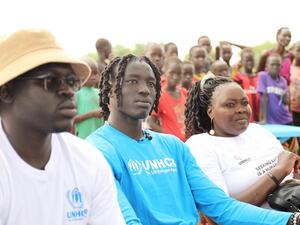For Mali's displaced, on-going insecurity an obstacle to return
For Mali's displaced, on-going insecurity an obstacle to return

Boats travelling from Mopti to Timbuktu resumed operations in early February. While the roads and airports remain closed due to the conflict, the Niger river is the only way for internally displaced persons (IDPs) to return to their homes in northern Mali.
MOPTI, Mali, February 12 (UNHCR) - The ancient city of Mopti, with its mud-built mosque, sits on a bend where the waters of West Africa's longest river, the Niger, are joined by those of its smaller tributary the Bani.
This confluence has made Mopti Mali's main river port and the gateway to the north of the country, a region where the Malian army, supported by French and West African forces, is battling Al-Qaeda-linked rebels.
Youba Traore, 33, is a primary school teacher who fled his home in the northern city of Timbuktu last April, when rebel groups drove out government forces and occupied the city. He is just one of the more than 240,000 displaced within Mali.
Following the recent recapture of Timbuktu by French and Malian forces, Traore left his family behind in the capital Bamako last week and travelled to Mopti where he bought a second class ticket on a boat that would take him on a two-day journey back to his home.
"I want to see how things are in Timbuktu first," he told UNHCR. "If everything is OK, I will go back and fetch them."
With the roads and airports still closed to civilian traffic by the conflict, the river is currently the only way to reach the north of the country.
Aisha Ayida was also planning to take the slow boat to Timbuktu with her two sons aged four and 18-months. Uprooted by the conflict, for the past eight months she had been living with a host family in Bamako. "I heard it is safe to go back now," she said. "And it was also becoming more difficult for me to stay with the family," she added.
At a tented site housing 70 internally displaced families on the outskirts of Mopti, residents were more cautious about returning to their homes in northern Mali. "We are all waiting for the situation to be calm and for security to return," explained 56-year old Boubakar Traore, a mechanic from the town of Hombori, who is also the chairman of the local association of internally displaced persons (IDPs).
Their prudence is justified. Over the weekend, an Al-Qaeda-linked rebel group attacked Gao, the largest city in the north, which had been retaken by French and Malian troops two weeks ago. Malian troops backed by French armoured vehicles and attack helicopters were back in control of the city on Monday after heavy fighting that lasted several hours and left a number of casualties, including civilians.
The on-going insecurity is the main obstacle to a sustainable return for the displaced, though it is not the only one.
"The situation in the north is critical," Traore, the mechanic, said. "What awaits us there is worse than the situation here. Food is scarce, we have lost our animals and our houses have not been maintained all these months. We will need help when we go back."
The UNHCR office in Mopti reopened earlier this month after closing for security reasons in the wake of the rebel advance. The refugee agency and its partners have been distributing relief items such as plastic tarpaulins and jerry cans to 234 of the neediest IDP households in Mopti. Earlier distributions in November and December benefitted thousands of families.
Additional relief supplies for up to 9,000 families are arriving in Mali, including sleeping mats, blankets, tarpaulins, jerry cans, mosquito nets and cooking utensils.
More than 400,000 people have been forced out of their homes by the conflict in Mali, including some 241,000 IDPs and 163,000 refugees who have crossed into Mauritania, Niger, Burkina Faso and Algeria.
UNHCR's total financial requirements for its operations in Mali, Burkina Faso, Mauritania and Niger in 2013 stand at USD 112 million. The refugee agency is appealing for urgent financial support from donors in order to continue its assistance programmes.
By William Spindler in Mopti, Mali








